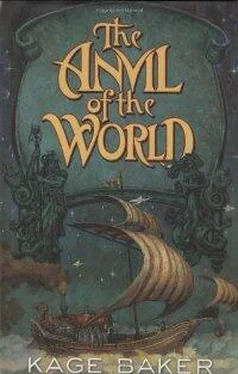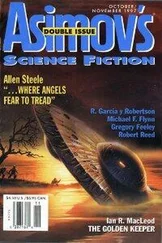Kage Baker - The Anvil of the World
Здесь есть возможность читать онлайн «Kage Baker - The Anvil of the World» весь текст электронной книги совершенно бесплатно (целиком полную версию без сокращений). В некоторых случаях можно слушать аудио, скачать через торрент в формате fb2 и присутствует краткое содержание. Год выпуска: 2003, ISBN: 2003, Издательство: Tor Books, Жанр: Фэнтези, на английском языке. Описание произведения, (предисловие) а так же отзывы посетителей доступны на портале библиотеки ЛибКат.
- Название:The Anvil of the World
- Автор:
- Издательство:Tor Books
- Жанр:
- Год:2003
- ISBN:0-765-30818-5
- Рейтинг книги:5 / 5. Голосов: 1
-
Избранное:Добавить в избранное
- Отзывы:
-
Ваша оценка:
- 100
- 1
- 2
- 3
- 4
- 5
The Anvil of the World: краткое содержание, описание и аннотация
Предлагаем к чтению аннотацию, описание, краткое содержание или предисловие (зависит от того, что написал сам автор книги «The Anvil of the World»). Если вы не нашли необходимую информацию о книге — напишите в комментариях, мы постараемся отыскать её.
finds former assassin Smith of the Children of the Sun people looking forward to his retirement and overseeing an endangered sea caravan in the wake of those who would kill him for his past deeds.
The Anvil of the World — читать онлайн бесплатно полную книгу (весь текст) целиком
Ниже представлен текст книги, разбитый по страницам. Система сохранения места последней прочитанной страницы, позволяет с удобством читать онлайн бесплатно книгу «The Anvil of the World», без необходимости каждый раз заново искать на чём Вы остановились. Поставьте закладку, и сможете в любой момент перейти на страницу, на которой закончили чтение.
Интервал:
Закладка:
There were people struggling in the wet churned ashes, turning the earth with spades, raking it level, bringing muddy armfuls of roots or even small trees to be planted. One man stalked from west to east, moving with a smooth and endless rhythm as he drew a fistful from the seed bag he carried, swung his arm wide, scattered seed on the earth like rain, dipped again.
The three standing stones were toppled, lying in a blackened tangle that had been rose briars, but there was a team at work raising one of them with makeshift levers and ropes. And on the bank of the river a woman stood, weaving hurdles from green willow wands.
She was a tall woman robed in white, though her robe was work-stained and muddy, and so were her feet and hands. Rain dripped from the wide brim of her hat. With strong hands she wove the slick palings, effortlessly shaping walls, driving them into the mud with a blow to set them; and where she struck each one it sprouted, gray catkins on the nearer, green leaves already shooting forth on the first she had set. Were the walls flowering, too? No; white butterflies were settling on them here and there.
“It’s Mother,” said Lord Ermenwyr, in a ghost of a voice.
She raised her head and looked at Smith. He caught his breath.
The woman had clear, clear eyes, and their gaze hit him like a beam of light. She was the most beautiful woman he had ever seen in his life, but somehow that fact went unnoticed by his flesh. She was spare and perfect as a steel engraving, and as ageless. She was simple as water, implacable as the white comber rolling, miraculous as rain in the desert.
They went ashore and picked their way through the ruins at the pier’s base, and the lady walked down to meet them.
Lord Ermenwyr cleared his throat. “Why, Mother, whatever are you doing here?” he inquired cautiously.
“Making a garden,” she replied. Her voice was beautiful, too.
Willowspear knelt before her, and she raised him with a hand under his chin, smiling. “Don’t worry,” she told him, and the phrase seemed to resonate with meaning, silence a hundred unspoken questions. “Now, let me see the hero.”
Smith wondered whether he ought to kneel. He had never felt so awkward in his life, obscurely ashamed of his maimed arm and the fact that no one had shaved him in three days.
“G-good morning, ma’am,” he said hoarsely. “There were some men who were stationed in—in the ruins over there. They were just watchmen. Were they killed, when the Orphans burned the place down?”
“No, they weren’t,” she said. “They got into the reeds and hid themselves. Though poor Mr. Bolter was dying of pneumonia when we arrived.” She turned and pointed at the stone, just lurching upright in its cradle of rope. Smith squinted at the figures surrounding it, and realized that three of them were Children of the Sun, covered though they were in mud and ashes like all the others there.
“Mr. Bolter!” the lady called. “Mr. Drill! Mr. Copperclad! The ship has come back. Would you like to go home now?”
The three turned abruptly, staring. They exchanged glances and began to walk across the field, but in a slow and reluctant manner. Three-quarters of the way there they stopped.
“Are you from Smallbrass?” demanded the one called Copperclad. “You can tell him, we quit. We haven’t been paid. No supply ship ever came, and she"—his voice broke—"she saved us. So we’re staying to help her!”
“Please, ma’am?” added Bolter.
“Thank you,” she said. “I would be grateful for your hard work.” They turned and walked rapidly back to the stones.
“Mother, how can you plan a garden here?” cried Lord Ermenwyr. “They’re going to build a city on it!”
The lady turned and regarded her son with a look of mild severity. He flinched, and Smith had to admire his composure; he himself would have been on his knees pleading for forgiveness.
“No,” she said. “Hlinjerith belongs to me, now. Your father made the necessary arrangements in their claim offices. When the Beloved comes again, he will find his sacred grove and his garden waiting for him.”
“Ah. How nice,” said Lord Ermenwyr, groping in his pocket for his smoking tube. “Well, I think I’ll just go on to Salesh—”
“The city will rise across the river,” his mother went on calmly. “You will build it for me, my son.”
Lord Ermenwyr froze in the act of lifting the tube to his lips. “What did you say?”
“You will build a city on that bank,” said the lady. “Bowers to shelter the pilgrims who will come. Gardens and greens, where classes will be taught. And a great library, and a guesthouse for the Children of the Sun, who are unaccustomed to living out of doors.”
“But—but—Mummy, I can’t!” Lord Ermenwyr wrung his hands in panic. “I don’t know anything about building! And I can’t live here, it’s so bloody damp and cold I’ll start growing toadstools! Why don’t you make Demaledon do it?”
“Because you would be better at it,” said his mother. “He doesn’t go among the Children of the Sun, as you do. You understand their culture, and their money, and their business practices. You will draw up plans, and order shipments of cut stone. You will hire workmen.”
“I think I’m starting to run a fever—”
“No, you’re not. I won’t see your talents wasted, my child. You’ve been running about the world on your father’s business long enough; it’s time you started tending to mine.”
“But the Children of the Sun wouldn’t come here,” Lord Ermenwyr protested.
“Yes, they would!” cried Willowspear. “I taught them meditation. I can teach them farming, and medicine.”
“Wait. Let’s consider this objectively, shall we?” Lord Ermenwyr said, widening his eyes in an attempt to look calm and reasonable. “They’re already overrunning the world. The only advantage we have over them is our knowledge of medicine, of agriculture, of, er, birth control and so forth. Now, do we really want to give them that knowledge?”
The lady looked at him sadly. “My child, that is a base and cynical thing to say. Especially in front of this man, who has suffered through your fault.”
Lord Ermenwyr winced so profoundly, he nearly lost his balance and fell over.
“Smith, I didn’t mean it like that! You almost wiped them out yourself, after all. Didn’t it seem the right thing to do, for a moment, back in that cave? Wouldn’t mass annihilation have solved a lot of problems? What I’m saying is, if the gods themselves thought that was a good idea, who are we to argue?”
“Maybe they’re not very nice gods,” said Smith. “If they kill their children. Maybe we should argue,”
“Perhaps,” the lady agreed. “And perhaps the gods were waiting to see if you’d give in to the temptation to destroy your world in a blaze of glory. It’s always so much easier to smash mistakes than to correct them. But if it wasn’t a test, then what can one assume but that the gods are foolish and not very powerful after all?”
She reached out and touched his shoulder. Where her hand passed, warmth flowed into him.
“I think that if your race could produce a man willing to make such a sacrifice, it’s a sign that they ought to be given another chance,” she said. “I intend to see that they have it.”
Lord Ermenwyr, who had been trying unsuccessfully to light his smoking tube in the damp air, said sullenly, “I’ll build your city for you, then. But if you’re expecting the kind of twits who sign up for meditation classes, I warn you now: They’re not interested in learning anything useful. All they want is a new religion.”
“They want it because they know there must be something better than violence and stupidity,” she told him sternly. “Their hearts are in the right places. We will make certain their minds follow. And one is coming who will lead them here, in the morning of the new world.”
Читать дальшеИнтервал:
Закладка:
Похожие книги на «The Anvil of the World»
Представляем Вашему вниманию похожие книги на «The Anvil of the World» списком для выбора. Мы отобрали схожую по названию и смыслу литературу в надежде предоставить читателям больше вариантов отыскать новые, интересные, ещё непрочитанные произведения.
Обсуждение, отзывы о книге «The Anvil of the World» и просто собственные мнения читателей. Оставьте ваши комментарии, напишите, что Вы думаете о произведении, его смысле или главных героях. Укажите что конкретно понравилось, а что нет, и почему Вы так считаете.












